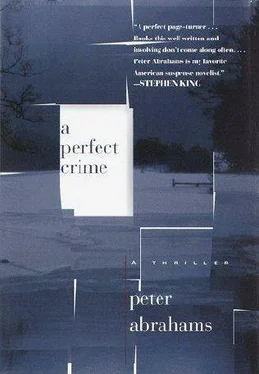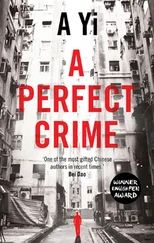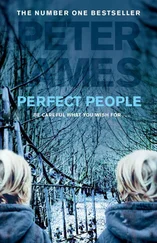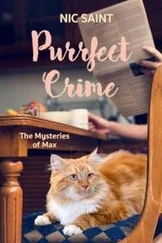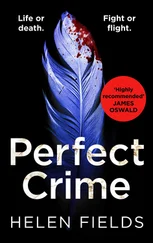Peter Abrahams - A Perfect Crime
Здесь есть возможность читать онлайн «Peter Abrahams - A Perfect Crime» весь текст электронной книги совершенно бесплатно (целиком полную версию без сокращений). В некоторых случаях можно слушать аудио, скачать через торрент в формате fb2 и присутствует краткое содержание. Жанр: Триллер, на английском языке. Описание произведения, (предисловие) а так же отзывы посетителей доступны на портале библиотеки ЛибКат.
- Название:A Perfect Crime
- Автор:
- Жанр:
- Год:неизвестен
- ISBN:нет данных
- Рейтинг книги:4 / 5. Голосов: 1
-
Избранное:Добавить в избранное
- Отзывы:
-
Ваша оценка:
- 80
- 1
- 2
- 3
- 4
- 5
A Perfect Crime: краткое содержание, описание и аннотация
Предлагаем к чтению аннотацию, описание, краткое содержание или предисловие (зависит от того, что написал сам автор книги «A Perfect Crime»). Если вы не нашли необходимую информацию о книге — напишите в комментариях, мы постараемся отыскать её.
A Perfect Crime — читать онлайн бесплатно полную книгу (весь текст) целиком
Ниже представлен текст книги, разбитый по страницам. Система сохранения места последней прочитанной страницы, позволяет с удобством читать онлайн бесплатно книгу «A Perfect Crime», без необходимости каждый раз заново искать на чём Вы остановились. Поставьте закладку, и сможете в любой момент перейти на страницу, на которой закончили чтение.
Интервал:
Закладка:
Peter Abrahams
A Perfect Crime
The scarlet letter was her passport into regions where other women dared not tread.
— Nathaniel Hawthorne1
Thursday, the best day of the week-the day of all days that Francie was predisposed to say yes. But here in the artist’s studio, with its view of the Dorchester gas tank superimposed on the harbor beyond, she couldn’t bring herself to do it. The problem was she hated the paintings. The medium was ink, the tool airbrush, the style photorealist, the subject slack-faced people in art galleries viewing installations; the installations, when she looked more closely, were neon messages fenced in with blood-tipped barbed wire, messages that though tiny could be read, when she looked more closely still. Francie, her nose almost touching the canvases, read them dutifully: name that tune; do you swear to tell the truth?; we will have these moments to remember.
“World within world,” she said, a neutral phrase that might be taken optimistically.
“I’m sorry?” said the artist, following her nervously around the studio.
Francie smiled at him-gaunt, hollow-eyed, twitchy, unkempt-Raskolnikov on amphetamines. She’d seen paintings of slack-faced people looking at paintings; she’d seen neon messages; she’d seen barbed wire, blood-tipped, pink, red-white-and-blue; seen art feeding on itself with an appetite that grew sharper every day.
“Anything else you’d like to show me?” she said.
“Anything else?” said the artist. “I’m not sure exactly what you..”
Francie kept her smile in place; artists lived uneasy lives. “Other work,” she explained, as gently as she could.
But not gently enough. He flung out his arm in a dramatic sweep. “This is my work.”
Francie nodded. Some of her colleagues would now say “I love it” and let him learn the bad news in a letter from the foundation, but Francie couldn’t. Silence followed, long and uncomfortable. Time slowed down, much too soon. On Thursdays, Francie wanted time to behave as it might in some Einsteinian thought experiment, hurrying by until dark, then almost coming to a stop. The artist gazed at his shoes, red canvas basketball sneakers, paint-spattered. Francie gazed at them, too. Do you swear to tell the truth? Even bad art could get to you, or at least to her. She saw something from the corner of her eye-a small unframed canvas, leaning against the jamb of a doorless closet, went closer, to end the shoe-gazing if nothing else.
“What’s this?” An oil painting of a plinth, cracked, crumbling, classical, bearing a bunch of grapes, wine-dark, overripe, even rotting. And in the middle ground, not hidden, not flaunted, simply there, was a lovely figure of a girl on a skateboard, all poise, balance, speed.
“That?” said the painter. “That’s from years ago.”
“Tell me about it.”
“What’s to tell? It was a dead end.”
“You didn’t do any more like it?” Francie knelt, turned the painting around, read the writing on the back: oh garden, my garden.
“By the dozen,” said the artist. “But I painted over them whenever I needed canvas.”
Francie kept herself from glancing at the busy pieces on the wall.
“That’s the last one, in fact. Why do you ask?”
“It has a kind of…” Something. It had that something she was always looking for, so hard to put in words. To sound professional, Francie said, “… resonance.”
“It does?”
“In my opinion.”
“No one liked them at the time.”
“Maybe I’m just a sucker for overripe fruit,” Francie said, although she already knew it wasn’t that. It was the girl. “Caravaggio, and all that,” she explained.
“Caravaggio?”
“You know,” she said, her heart sinking.
“A kind of grape?”
“He said that? A kind of grape?” Nora, having finished her lunch-a very late lunch, eaten on their feet at a coffee place in the North End-helped herself to Francie’s. “Soon the past will be completely forgotten.”
“And life can begin,” said Francie.
Nora paused in midbite. “You feeling okay?”
“Why do you ask?”
“How’s Jolly Roger these days?”
“Why do you ask?”
Nora laughed, choked slightly, wiped her mouth. “Can you play for me tonight?”
Nora meant tennis: they belonged to the same club, had played together since eighth grade. “Not on Th-no,” Francie said.
“I hate to cancel on her.”
“Who?”
“Anne? Anita? New member. Shy little frau, but she has a nice game. You should meet her.”
“Not tonight.”
“You said that. What’s tonight?”
“Work,” Francie said, not without a twinge inside. “And you?”
“Got a date. He called me this morning.”
“For tonight? And you said yes?”
“He already knows I’ve been married twice-do I have to simper like a virgin for the rest of my life?”
“Who’s the lucky guy?”
“Bernie something.”
Francie picked up the check-Nora’s settlement from marriage one had gone the other way the second time-and got her car from the parking garage. She turned on the radio, found Ned, drove out of the city.
“And we’re back. I’m Ned Demarco, the program is Intimately Yours, our beat marriage, love, family in this increasingly complex world. It’s Thursday, and as our regular listeners know, Thursday is our free-form day, open-forum time, no studio guests, no set topics. We talk about what you out there want to talk about. Welcome to the program, Marlene from Watertown.”
“Dr. Demarco?”
“Ned, please.”
“Ned. Hi. I really enjoy your show.”
“Thank you, Marlene. What’s on your mind?”
“First, can I ask you something?”
“Shoot.”
“That voice of yours. Do they do anything to, like, enhance it?”
Ned laughed. “Lucy, in the control room: Doing anything to enhance my voice?” He laughed again, easy and natural. More relaxed with every show, Francie thought. “Lucy says she’s doing all that science possibly can. Anything else, Marlene?”
“It’s about my husband, I guess.” The woman paused.
“Go on.”
“He-he’s a wonderful father, an excellent provider. Even helps out around the house.”
“Sounds ideal.”
“I know. Which is why I feel so guilty for saying this, even having it in my mind.”
“Having what in your mind, Marlene?”
She took a breath, deep and troubled, audible down her phone line, over the air, through the speakers in Francie’s car. “Lately I’ve been daydreaming a lot about this boy I went with back in high school. And nightdreaming. I’m talking about all the time, Dr.-Ned. And my question is, Would there be any harm in looking him up?”
Ned paused. Francie could feel him thinking. She drove into a tunnel and lost him before the answer came.
The city dwindled in her rearview mirror until there was nothing left but the tops of the two big towers that gave downtown its distinctive look, intruding on a cold, silvery sky. Francie crossed the New Hampshire line, drove north on roads of less and less importance, entered the wilderness beyond the last bed-and-breakfast, and came to Brenda’s gate at dusk. She got out of the car, unlocked the gate, drove through, leaving the gate closed but unlocked, as she always did. The rutted track, thick with dead leaves, led up over a hill, then down through rocky meadows to the river. Most of the light had drained from the sky, but the river held on to what was left, in odd blurred streaks of red, orange, and gold: like an autumnal Turner seen through a fingerprint-smeared lens. Francie stopped in front of the little stone jetty, where two dinghies-red Prosciutto and green Melone- were fastened to the lee side. Climbing into one, she discovered the cause of the odd blurring-a skin of ice lay on the river. So soon? She rowed out to the island, oar blades slicing through the fiery glaze, sheared ice scratching against her bows.
Читать дальшеИнтервал:
Закладка:
Похожие книги на «A Perfect Crime»
Представляем Вашему вниманию похожие книги на «A Perfect Crime» списком для выбора. Мы отобрали схожую по названию и смыслу литературу в надежде предоставить читателям больше вариантов отыскать новые, интересные, ещё непрочитанные произведения.
Обсуждение, отзывы о книге «A Perfect Crime» и просто собственные мнения читателей. Оставьте ваши комментарии, напишите, что Вы думаете о произведении, его смысле или главных героях. Укажите что конкретно понравилось, а что нет, и почему Вы так считаете.
